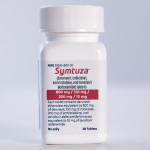Once-daily Norvir (ritonavir)-boosted Prezista is as effective and associated with fewer side effects compared with standard twice-daily dosing in treatment-experienced patients, according to 48-week data from a clinical trial reported on Wednesday, February 17, at the 17th Conference on Retroviruses and Opportunistic Infections (CROI) in San Francisco. Of note, these encouraging results only apply to those without any HIV mutations known to confer resistance to Prezista (darunavir).
Prezista is currently approved for once-daily use for people living with HIV starting therapy for the first time and twice-daily use for treatment-experienced patients. Though a small study reported in the October 2008 issue of the Journal of Acquired Immune Deficiency Syndromes indicated that once-daily Norvir-booster Prezista may be an option for treatment-experienced patients without HIV mutations known to cause Prezista resistance, the study investigators said that results from the much larger ODIN clinical trial would be needed to confirm their initial findings.
Results from ODIN were reported at CROI by Pedro Cahn, MD, of the Fundacion Huesped in Buenos Aires and his colleagues. The study investigators randomized 590 HIV-positive individuals, all of whom were on a stable antiretroviral regimen, to receive once-daily (100/800 mg) or twice-daily (100/600 mg) Norvir-boosted Prezista in combination with optimized background therapy (OBT). Excluded from the study were any patients with mutations in HIV protease—including V11I, V32I, L33F, I47V, I50V, I54L, I54M, T74P, L76V, I84V, L89V—associated with Prezista resistance.
The average viral load and CD4 count upon entering the study were above 50,000 copies and 225 cells, respectively. The majority of study participants were able to include at least two active drugs, determined using drug-resistance testing, in their OBT.
It is important to note that many patients entered ODIN with a high degree of HIV susceptibility to protease inhibitors. About 46 percent of patients had not used a protease inhibitor, and 86 percent had virus susceptible to eight protease inhibitors.
After 48 weeks in the study, 72.1 percent of patients in the once-daily group and 70.9 percent of patients in the twice-daily group had viral loads below 50 copies. This finding allowed Cahn’s group to conclude that once-daily Norvir-boosted Prezista is non-inferior, or comparable to, twice-daily Norvir-boosted Prezista.
The researchers also reported similarities between patients with either low or high pre-study viral loads. Among those with viral loads below 50,000 copies, 78.4 percent of those receiving once-daily Norvir-boosted Prezista achieved undetectable viral loads by week 48, compared with 76.8 percent of those entering the study with viral loads below 50,000 copies. As for those with viral loads above 50,000 copies before entering the study, the end results were 52.8 percent below 50 copies after 48 weeks in both groups.
CD4 counts increased by 100 cells in the once-daily group and 94 cells in the twice-daily group.
Once-daily Norvir-boosted Prezista also appeared to be better tolerated that twice-daily dosing. Moderate-to-severe (Grade 3 or 4) adverse events were less common among those in the once daily group—7.8 percent versus 15.2 percent in the twice-daily group. What’s more, the incidence of lipid abnormalities in the once-daily group, including elevations in triglycerides, total cholesterol and “bad” LDL cholesterol, was roughly half that of twice-daily Norvir-boosted Prezista.
Increases in liver enzymes were also more likely in the twice-daily group, though the difference compared with those in the once-daily group was not statistically significant.
In conclusion, Cahn said, once-daily Norvir-boosted Prezista was effective and non-inferior to twice-daily dosing in treatment-experienced patients without Prezista-related HIV mutations. Virologic failure was low and rarely resulted in resistance; only one patient developed HIV mutations associated with resistance to protease inhibitors, including Prezista. “These findings suggest that once-daily [Norvir-boosted Prezista] could be considered an option for patients failing previous treatments with no [resistance to Prezista].”
Advertisement
Advertisement
Advertisement






Comments
Comments